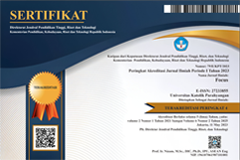Etika Al-Ghazālian dan Titik Temunya dengan Etika Kantian
DOI:
https://doi.org/10.26593/focus.v3i1.5812Keywords:
metode hipotetis, etika mistik, anti-rasio, tasawufAbstract
With his immense intellectual stature and his encyclopaedic knowledge, al-Ghazâli has influenced Islamic thought and defined its practice for nearly nine centuries. Like many legal experts and philosophers, al-Ghazâli divides the universe into the transient world and the eternal hereafter. This world, or temporary existence, is subject to the will of God. It is not governed by a set of scientific laws, but is maintained, governed and driven by the direct and continual intervention of God (rejection of causality). God is not only the creator of the universe and of its attributes and laws (or the cause of existence). He is also the cause of every event in the world, great and small, past, present and future. As a Sufi, al-Ghazâli does have a theory of ethic as a part of his tasawuf discipline. Some experts come to consider al-Ghazâli as a Sufi figure, some other also goes to classify him as a prominent figure of philosophy. This is understandable actually, because from the books he wrote all indicates his interest on both tasawuf as well as philosophy. By considering his books Maqâshid al-Falâsifah or Tahâfut al-Falâsifah, or through his Mi’yâr al’Ilm, one would consider him as a true philosopher. But one might also comes to conclude him as a real Sufi or a true mystic simply by looking at his master piece works such as Ihyâ al-Ulûm al-Dîn, or Kitab al-Arbâ’in dan al-Munqidz min al-Dhalâl.
References
Abdullah, M. Amin. The Idea of Universality of Ethical Norms in Ghazali and Kant. Turki: Diyanet Vakfi, 1992.
______________. Antara Al-Ghazali dan Kant. Filsafat Etika Islam. Bandung: Penerbit Mizan, 2002.
al-Ghanimi al-Taftazami, Abu Al-Wafa’. Sufi dari Zaman ke Zaman. Bandung: Pustaka Setia, 1979.
Al-Ghazāli, Al-Munqidz min al-Dhalâl. Istanbul: Daar Darus Safeka, 1996.
______________. Tahâfut al-Falâsifah. Kairo: Dar al-Ma’arif, 1996.
al-Nassy, Yusuf dan Ali al-Farm. Ensiklopedi Islam jilid 5. Jakarta: Ichtiar Baru Van Hoeve, 1993.
Anwar, Rosihon. Ilmu Tasawuf. Bandung: Pustaka Setia, 2006.
Arnaldez, R. “Ibn Rushd.” B. Lewis, ed., et. al., The Encyclopaedia of Islam, Vol. iii. Leiden: E.J. Brill, 1971.
Asmuni, M. Yusron. Pertumbuhan dan Perkembangan Berfikir dalam Islam. Surabaya: Al Ikhlas, 1994.
Durant, Will. The Story of Philosophy. New York: Pocket Books, 1955.
Faris, Nabih Amin. The Book of Knowledge (terjemahan bahasa Inggris dari Kitâb al-‘Ilm dari Ihyâ), S.H. Muhammad Asharf. Lahore: 1962.
Grunebaum, G.E. von. “Concept and Function of reason in Islam.” Oriens, vol.15, 1962.
Hanafi, Ahmad. Pengantar Filsafat Islam. Jakarta: Bulan Bintang, 1991.
Hourani, George F. “Ethics in Medieval Islam: A Conspectus.” Essays on Islamic Philosophy and Science, ed. George F. Hourani. Albany: State University of New York Press, 1975.
______________. Reason and Tradition in Islamic Ethics. Cambridge: Cambridge University Press, 1985.
Jaya, Yahya. Spiritualisme Islam dalam Mengembangkan Kepribadian dan Kesehatan Mental. Jakarta: Ruhana, 1994.
Kant, Immanuel. Grundlegung zur Metaphysik der Sitten terj. Theodor Valentiner, Groundwork of the Metaphysics of Morals. Stuttgart: Reclam, 1965.
Kröner, Richard. Kant’s Weltanschaung, terj. John E. Smith. Chicago: The University of Chicago Press, 1970.
Langgulung, Hasan. Beberapa Pemikiran tentang Pendidikan Islam. Bandung: Al-Ma’arif, 1980.
Leaman, Oliver. Averroes and his Philosophy. Oxford: Clarendon Press, 1988.
Madjid, Nurcholis. Khazanah Intelektual Islam. Jakarta: Bulan Bintang,1984.
Manaf, Muhsin. Psyco Analisa Al Ghazāli. Surabaya: Al-Ikhlas, 2001.
Montgomery, W. “Al-Ghazali.” The Encyclopedia of Islam, ed. B. Lewis et.al., jilid II. Leiden: E.J. Brill, 1965.
Morrison, A. and D. McIntyre. Schools and socialization. London: Penguin Harmondsworth, 1972.
Muḥammad bin Idrīs al-Syafiʿī, Abū ʿAbdullāh. al-Umm, Juz I. Beirūt: Dār al-Fikr, tth.
Mulyana, Deddy. Metodologi Penelitian Kualitatif Paradigma Baru Ilmu Komunikasi dan Ilmu Sosial Lainnya. Bandung: PT. Remaja Rosdakarya, 2003.
Musa, Jalal Muhammad Abd al-Hamid. Nasy 'at al-Asy’ariyah wa Tathawwuruhaha. Beirut: Dar al-Kitab al-Lubnaniy, 1975.
Mustofa. Filsafat Islam. Bandung: Pustaka Setia, 2009.
Nashr, Seyyed Hossein. Intelektual Islam; Teologi, Filsafat dan Gnosis, terj. Suharsono dan Djamaluddin MZ. Jakarta: Pustaka Pelajar, 1996.
Nasution, Harun. Falsafah dan Mistisisme dalam Islam. Jakarta: Bulan Bintang, 1973.
Nasution, Hasyimsyah. Filsafat Islam. Jakarta: Gaya Media Pratama, 2013.
Nata, Abuddin. Perspektif Islam tentang Pola Hubungan Guru-Murid. Jakarta: Raja Grafindo Persada, 2001.
Quine, W.V.O. “Two Dogmas of Empiricism,” Classics of Analytical Philosophy, edited by Robert R. Ammerman. Indianapolis: Hackett Publishing Company, 1997.
Rahman, Fazlur. Islam. Chicago: University of Chicago Press, 1979.
Ramayulis dan Samsul Nizar. Ensiklopedi Tokoh Pendidikan Islam di Dunia Islam dan Indonesia. Ciputat: Quantum Teaching, 2005.
Ree, Jonathan and J.O. Urmson. The Concise Encyclopedia of Western Philosophy. London-New York: Routledge, 2005.
Saefuddin, A. Percikan Pemikiran Imam Al-Ghazali. Bandung: Pustaka Setia, 2005.
Sherif, Muhammed Ahmed. Al-Ghazali’s Theory of Virtue. Albany: State University of New York Press, 1975.
Sholihin, M. Epistemologi Ilmu dalam Pandangan Imam Al-Ghazāli. Jakarta: Pustaka Setia, 2001.
Smith, Margareth. Pemikiran dan Doktrin Mistis Imam Al Ghazāli. Jakarta: Riora Cipta, 2000.
Sudarsono. Filsafat Islam. Jakarta: Rineka Cipta, 2004.
Qordawi, Yusuf. Al Ghazāli baini Maa dihiihi wa Naaqidihi. Kairo: Maktabah Wahbah, 2012.
Syadani, Ahmad. Filsafat Umum. Bandung: Pustaka Setia, 1997.
Wood, W. Kant’s Moral Religion. Ithaca: Cornell University Press, 1970.
Wolfson, H.A. The Philosophy of the Kalam. Masschussets: Cambridge University Press, 1976.
Zar, Sirajuddin. Filsafat Islam: Filosof dan Filsafatnya. Jakarta: PT. Raja Grafindo Persada, 2007.

Downloads
Published
Issue
Section
License
Copyright (c) 2022 R.F. Bhanu Viktorahadi

This work is licensed under a Creative Commons Attribution-ShareAlike 4.0 International License.



















